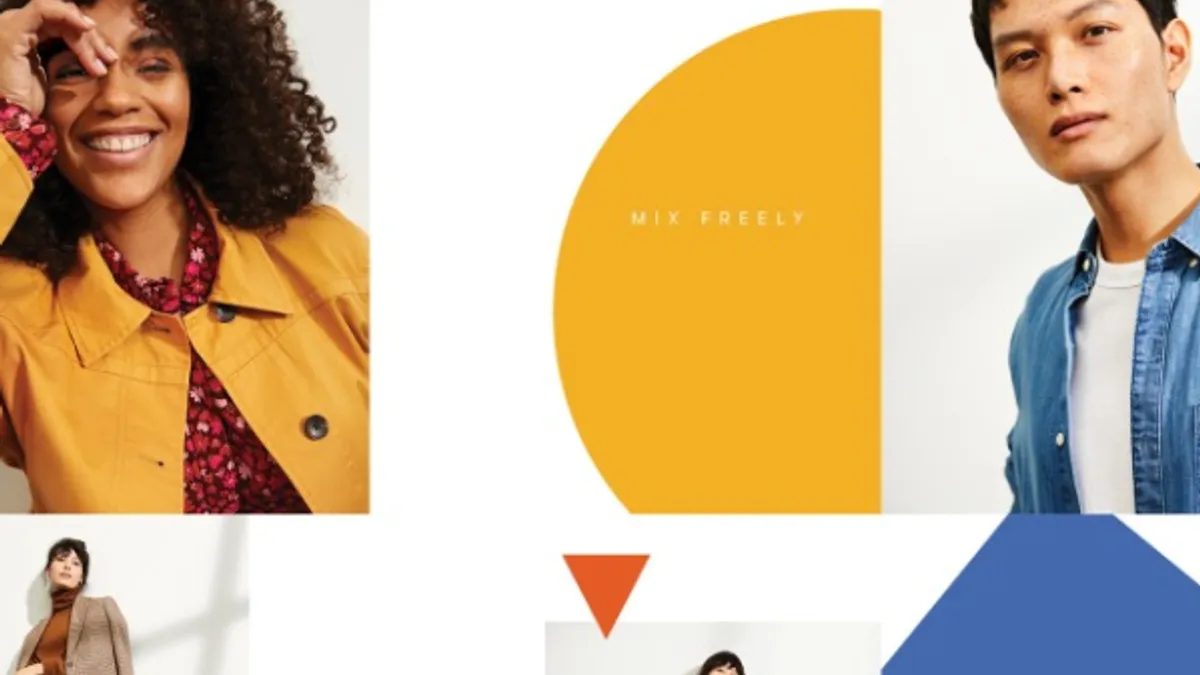Dive Brief:
-
Walmart on Monday unveiled Free Assembly, a private apparel label priced between $9 and $45. The Fall collection includes more than 30 items for women and 25 items for men, according to a company blog post from Denise Incandela, Walmart senior vice president of Women's Group, Elevated and Online Brands.
-
Development of the line, which is available online and in select stores, was led by Dwight Fenton, whose resume includes J. Crew, Old Navy and, most recently, Walmart-owned Bonobos, according to another post from Incandela.
-
The move comes on the heels of the launch of a discount line from Walmart-owned Eloquii, an online-only women's plus brand the retail giant acquired two years ago. "Eloquii Elements" is available at Walmart.com in addition to Eloquii's own site.
Dive Insight:
Walmart's Free Assembly is the latest attempt to get attention in fashion.
Two years ago the retail giant unveiled a series of new in-house apparel brands for men, women and kids, while also accumulating several direct-to-consumer labels including Bonobos, Eloquii and ModCloth. Last year ModCloth was sold off and Bonobos downsized.
Some 15 years ago, Walmart ads were seen in Vogue magazine, around when the company sponsored a New York City fashion show to highlight new, higher-priced apparel lines. But what has been seen as a retreat from such endeavors may just be an adjustment, as Walmart's apparel pure plays and now Free Assembly represent more casual, if stylish, design.
Moreover, Walmart is moving to sell more of this merchandise under its own banner and even into its stores, nearly 4,000 of which operate in the U.S. under the Walmart namesake alone. The retailer has profited from growth in online grocery as consumers who turned to the channel to avoid store-based shopping during the pandemic also noticed how convenient it can be. In its most recent quarter e-commerce doubled as U.S. store comps rose 9.3% and U.S. operating income grew 8.5%.
That is earning Walmart new sales and probably even new customers, but also landing it new costs. The company recently introduced Walmart+, a yearly subscription designed to defray some of that and lock in customers. But Free Assembly may be a page in a playbook to offset thin or nonexistent margins in grocery, especially online grocery, by boosting sales of higher margin goods like apparel and home goods — a playbook mastered at Target.
"Walmart is big in apparel, but this is mostly because its size and reach," GlobalData Retail Managing Director Neil Saunders said in an email. "It is an easy and convenient option for existing customers to buy basics, but it does less well at taking share of wallet from more fashion-focused shoppers. It also underperforms with younger shoppers. As a result, Walmart's clothing business is under-potentialized."
The introduction of new apparel labels "makes sense" in addressing that, by "emphasizing newness and creating brands that are distinct from the Walmart name." But Walmart has far to go, if it's to get close to honing the private label skills evident at its smaller rival, according to Saunders.
"Walmart needs to appreciate that Target's success came from taking a fully integrated approach to fashion: it didn't just create new brands, it changed the way it displayed and merchandised them in store and developed a whole brand personality which was infused in marketing and customer communication," Saunders said. "Walmart needs to learn from this."
















